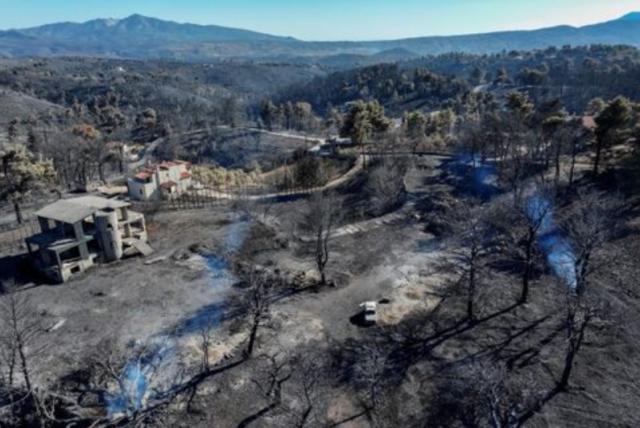Greece’s worst wildfire of the year eases
Firefighting efforts gain ground as severe wildfire near Athens slows, with one death and extensive damage reported

Greece's worst wildfire of the year eased on the outskirts of the capital Athens on Tuesday thanks to weaker winds, pausing the progress of a destructive blaze that killed one person and torched cars, buildings, fields and forests.
Hundreds of firefighters backed by 10 waterbombing aircraft battled the blaze since Sunday as it barrelled from a forest into Athens' northern suburbs, torching homes and stirring panic in neighbourhoods that had not seen such a fire so close to the centre in decades.
"The situation has improved, but there are random blazes. At the time being we don't have any new fronts, only some rekindlings, but we remain on high alert," said a fire brigade official.
The government has announced compensation and relief measures for victims of a fire that Greece's National Observatory said had damaged around 10,000 hectares of land. Prime Minister Kyriakos Mitsotakis was expected to chair a ministerial meeting about the fire on Tuesday evening.
As the smoke-filled skies cleared above Athens, firefighting aircraft arrived from France and Italy as part of a European civil protection mechanism, a government official said. The Czech Republic sent 75 firefighters and 25 engines to assist ground teams.
The blaze on Monday reached the suburb of Vrilissia, about 14 km (8 miles) from central Athens, where a 64-year-woman was found dead inside a local business, witnesses said.
The cause of the wildfire was not yet determined.
With high winds expected to pick up again, Greece will remain on high fire alert until Thursday, with temperatures forecast up to 40 degrees Celsius (104 degrees Fahrenheit).
Summer cycle
Wildfires have been a common feature of Greek summers for years: its deadliest blaze killed 104 people in the seaside town of Mati in 2018. But climate change has brought hotter weather and less rain, heightening the risk.
Greece had its warmest winter on record this year and was on track for its hottest summer with scant rain in many areas.
"The wildfire had all the characteristics that we, as firefighters, don't want a forest fire to have. A combination of hot, dry and windy (conditions)," Nikos Lavranos, head of the Greek federation of fire service employees, told Greek TV.
"It was extremely aggressive, difficult to manage and unpredictable," he said.
Blazes have broken out across southern Europe this summer, including in Spain and the Balkans.
Residents and firefighters returned to some areas of Athens on Tuesday to assess the damage - kitchens and living rooms blackened by fire, ceilings caved in, and cars reduced to sooty frames.
"My house was utterly destroyed, even the walls fell down. There's nothing left," said Sakis Morfis, 70. "The only thing I cared about was saving my dogs, so I left everything (else) behind."
More than 30 areas were evacuated, along with at least three hospitals, with power cuts in parts of the wider Athens region.
Measures announced by the climate crisis and civil protection ministry on Tuesday include rent subsidies, a three-year property tax exemption, and financial aid.
Opposition parties accused the government of not doing enough to prevent the disaster.


















COMMENTS
Comments are moderated and generally will be posted if they are on-topic and not abusive.
For more information, please see our Comments FAQ